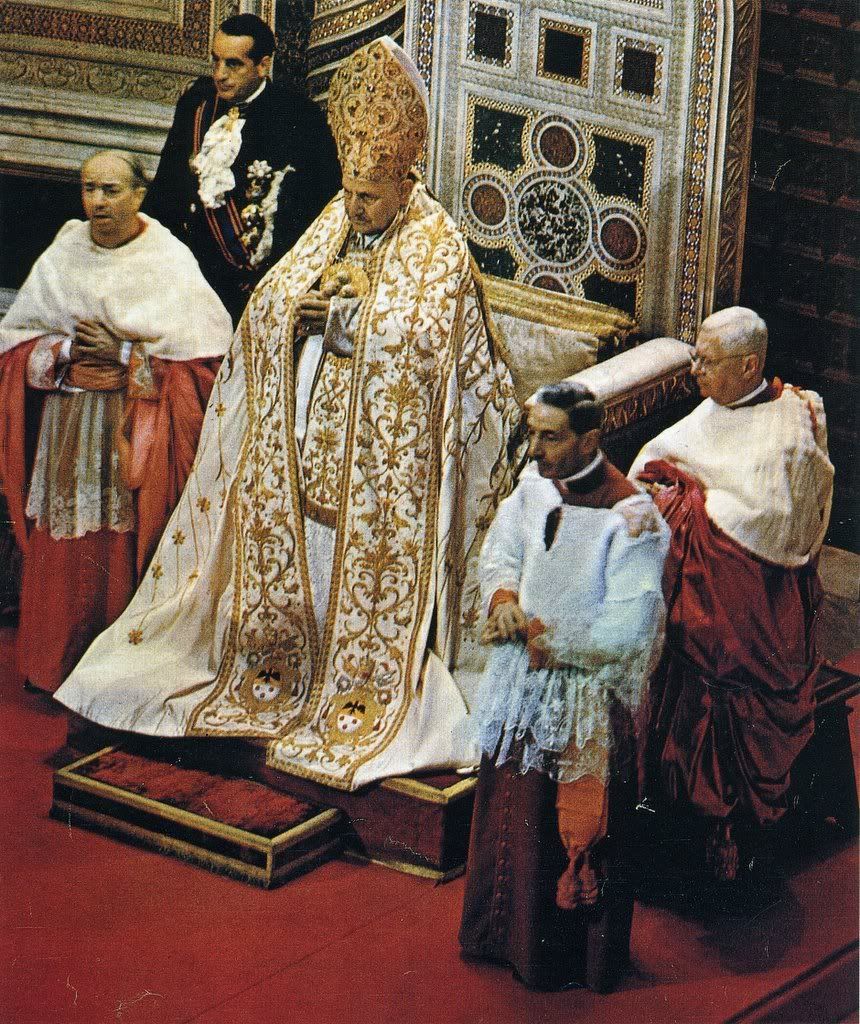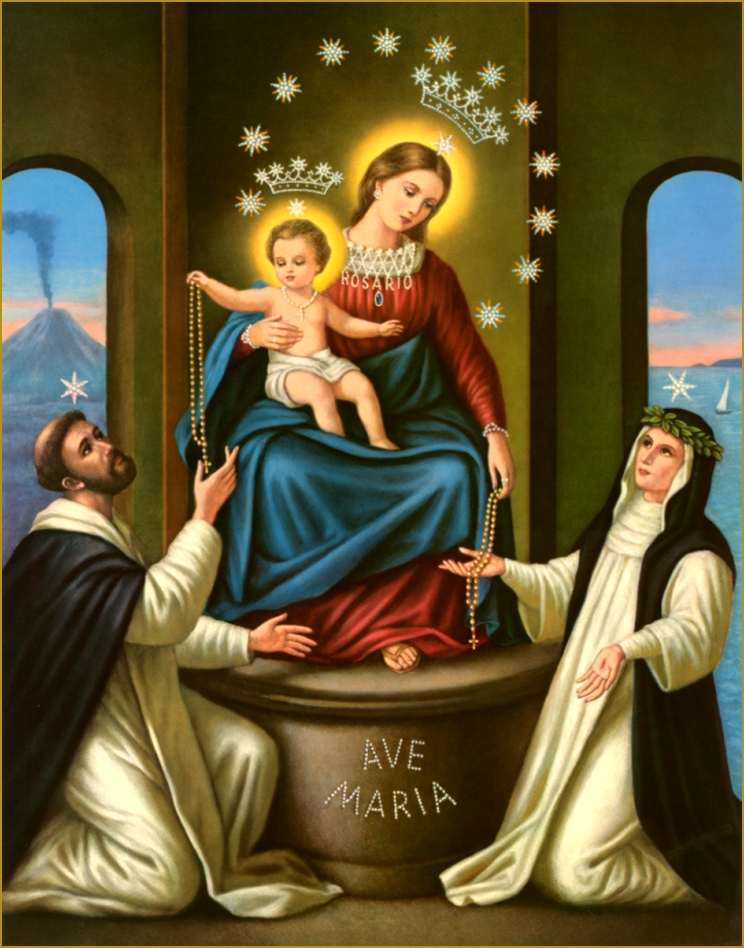
Apostolic Letter of Pope John XXIII
ON PROMOTING DEVOTION TO THE MOST PRECIOUS BLOOD OF OUR LORD JESUS CHRIST
To his Venerable Brother Patriarchs, Primates, Archbishops, Bishops and other Local Ordinaries in Peace and Communion with the Apostolic See
Venerable brethren: greetings and apostolic blessings.
From the very outset of our pontificate, in speaking of daily devotions we have repeatedly urged the faithful (often in eager tones that frankly hinted our future design) to cherish warmly that marvellous manifestation of divine mercy toward individuals and Holy Church and the whole world redeemed and saved by Jesus Christ: we mean devotion to his Most Precious Blood.
From infancy this devotion was instilled in us within our own household. Fondly we still recall how our parents used to recite the Litany of the Most Precious Blood every day during July.
The Apostle's wholesome advice comes to mind: "Keep watch, then, over yourselves, and over God's Church, in which the Holy Spirit has made you bishops; you are to be the shepherds of that flock which he won for himself at the price of his own blood."[1] Now among the cares of our pastoral office, venerable brethren, we are convinced that, second only to vigilance over sound doctrine, preference belongs to the proper surveillance and development of piety, in both its liturgical and private expressions. With that in mind, we judge it most timely to call our beloved children's attention to the unbreakable bond which must exist between the devotions to the Most Holy Name and Most Sacred Heart of Jesus -- already so widespread among Christians -- and devotion to the incarnate Word's Most Precious Blood, "shed for many, to the remission of sins."[2]
It is supremely important that the Church's liturgy fully conform to Catholic belief ("the law for prayer is the law for faith"[3]), and that only those devotional forms be sanctioned which well up from the unsullied springs of true faith. But the same logic calls for complete accord among different devotions. Those deemed more basic and more conducive to holiness must not be at odds with or cut off from one another. And the more individualistic and secondary ones must give way in popularity and practice to those devotions which more effectively actuate the fullness of salvation wrought by the "one mediator between God and men, Jesus Christ, who is a man, like them, and gave himself as a ransom for them all." [4] Through living in an atmosphere thus charged with true faith and solid piety the faithful can be confident that they are "thinking with the Church" and holding fast in the loving fellowship of prayer to Christ Jesus, the high priest of that sublime religion which he founded and which owes to him its name, its strength, its dignity.
The Church's wonderful advances in liturgical piety match the progress of faith itself in penetrating divine truth. Within this development it is most heart-warming to observe how often in recent centuries this Holy See has openly ap proved and furthered the three devotions just mentioned. From the Middle Ages, it is true, many pious persons prac ticed these devotions, which then spread to various dioceses and religious orders and congregations. Nevertheless it remained for the Chair of Peter to pronounce them orthodox and approve them for the Church as a whole.
Suffice it to recall the spiritual favours that our predecessors from the sixteenth century on have attached to prac ticing devotion to the Most Holy Name of Jesus, which in the previous century St. Bernardine of Siena untiringly spread throughout Italy. Approval was given first to the Office and Mass of the Most Holy Name and later to the Litany.[5] No less striking are the benefits the popes have attached to practising devotion to the Most Sacred Heart of Jesus, whose rise and spread owe so much to the revelations of the Sacred Heart to St. Margaret Mary Alacoque.[6] So highly have all the popes regarded this devotion that again and again in their official acts they have expounded its nature, defended its validity, promoted its practice. Their crowning achievement on this devotion are three splendid encyclicals.[7]
Likewise the devotion to the Most Precious Blood, which owes its marvellous diffusion to the 19th-century Ro man priest, St. Gaspar del Bufalo, has rightly merited the approval and backing of this Apostolic See. We may recall that by order of Benedict XIV the Mass and Office in honour of the divine Saviour's adorable Blood were composed. And to fulfill a vow made at Gaeta Pius IX extended the feast to the whole Church.[8] Finally, as a commemoration of the nineteenth centenary of our redemption, Pius XI of happy memory raised this feast to the rank of first-class double, so that the greater liturgical splendour would highlight the devotion and bring to men more abundant fruits of the re deeming Blood.
Following our predecessors' example we have taken further steps to promote the devotion to the Precious Blood of the unblemished Lamb, Jesus Christ. We have approved the Litany of the Precious Blood drawn up by the Sacred Congregation of Rites and through special indulgences have encouraged its public and private recitation throughout the Catholic world. Amid today's most serious and pressing spiritual needs, may this latest exercise of that "care for all the churches"[9] proper to our sovereign office awaken in Christian hearts a firm conviction about the supreme abiding effectiveness of these three devotions.
As we now approach the feast and month devoted to honouring Christ's Blood ---- the price of our redemption, the pledge of salvation and life eternal -- may Christians meditate on it more fervently, may they savour its fruits more frequently in sacramental communion. Let their meditations on the boundless power of the Blood be bathed in the light of sound biblical teaching and the doctrine of the Fathers and Doctors of the Church. How truly precious is this Blood is voiced in the song which the Church sings with the Angelic Doctor (sentiments wisely seconded by our predecessor Clement VI [10] ) :
Blood that but one drop of has the world to win
All the world forgiveness of its world of sin. [11]
Unlimited is the effectiveness of the God-Man's Blood -- just as unlimited as the love that impelled him to pour it out for us, first at his circumcision eight days after birth, and more profusely later on in his agony in the garden,[12] in his scourging and crowning with thorns, in his climb to Calvary and crucifixion, and finally from out that great wide wound in his side which symbolizes the divine Blood cascading down into all the Church's sacraments. Such sur passing love suggests, nay demands, that everyone reborn in the torrents of that Blood adore it with grateful love.
The Blood of the new and eternal covenant especially deserves this worship of latria when it is elevated during the sacrifice of the Mass. But such worship achieves its normal fulfilment in sacramental communion with the same Blood, indissolubly united with Christ's eucharistic Body. In intimate association with the celebrant the faithful can then truly make his sentiments at communion their own: "I will take the chalice of salvation and call upon the name of the Lord. . . The Blood of our Lord Jesus Christ preserve my soul for everlasting life.
Amen." Thus as often as they come worthily to this holy table they will receive more abundant fruits of the redemption and resurrection and eternal life won for all men by the Blood Christ shed "through the Holy Spirit."[13] Nourished by his Body and Blood, sharing the divine strength that has sustained count less martyrs, they will stand up to the slings and arrows of each day's fortunes -- even if need be to martyrdom itself for the sake of Christian virtue and the kingdom of God. Theirs will be the experience of that burning love which made St. John Chrysostom cry out:
Let us, then, come back from that table like lions breathing out fire, thus becoming terrifying to the Devil, and remaining mindful of our Head and of the love he has shown for us. . . This Blood, when worthily received, drives away demons and puts them at a distance from us, and even summons to us angels and the Lord of angels. . . This Blood, poured out in abundance, has washed the whole world clean. . . This is the price of the world; by it Christ purchased the Church... This thought will check in us unruly passions. How long, in truth, shall we be attached to present things? How long shall we remain asleep? How long shall we not take thought for our own salvation? Let us remember what privileges God has bestowed on us, let us give thanks, let us glorify him, not only by faith, but also by our very works. [14]
If only Christians would reflect more frequently on the fatherly warning of the first pope: "Look anxiously, then, to the ordering of your lives while your stay on earth lasts.
You know well enough that your ransom was not paid in earthly currency, silver or gold; it was paid in the precious blood of Christ; no lamb was ever so pure, so spotless a victim."[15] If only they would lend a more eager ear to the apostle of the Gentiles: "A great price was paid to ransom you; glorify God by making your bodies the shrines of his presence."[16] Their upright lives would then be the shining ex ample they ought to be; Christ's Church would far more effectively fulfill its mission to men. God wants all men to be saved,[17] for he has willed that they should all be ransomed by the Blood of his only-begotten Son; he calls them all to be members of the one Mystical Body whose head is Christ. If only men would be more responsive to these promptings of his grace, how much the bonds of brotherly love among individuals and peoples and nations would be strengthened. Life in society would be so much more peaceable, so much worthier of God and the human nature created in his image and likeness.[18]
This is the sublime vocation that St. Paul urged Jewish converts to fix their minds on when tempted to nostalgia for what was only a weak figure and prelude of the new covenant: "The scene of your approach now is mount Sion, is the heavenly Jerusalem, city of the living God; here are gathered thousands upon thousands of angels, here is the assembly of those first-born sons whose names are written in heaven, here is God sitting in judgment on all men, here are the spirits of just men, now made perfect; here is Jesus, the spokesman of the new covenant, and the sprinkling of his blood, which has better things to say than Abel's had." [19]
We have full confidence, venerable brethren, that these fatherly exhortations of ours, once brought to the attention of your priests and people in whatever way you deem best, will be put into practice not just willingly but enthusiastically. As a sign of heavenly graces and our affection we im part our most heartfelt apostolic blessing to each of you and to all your flocks, and particularly to those who respond with devout generosity to the promptings of this letter.
Given at St. Peter's in Rome, the eve of the feast of Our Lord Jesus Christ's Most Precious Blood, June 30, 1960, the second year of our pontificate.
1. Acts 20:28.
2. Matthew 26 :2&
3. Encyclical "On the Sacred Liturgy," America Press edition (New York: 1954), No. 46.
4. I Timothy 2:5-6.
5. Acta Sanctae Sedis 18 (1886) :509.
6. Cf. Office for the feast of the Most Sacred Heart of Jesus, 2nd nocturn, lesson 5.
7. "On the Consecration of mankind to the Sacred Heart of Jesus," The
Great Encyclical Letters of Pope Leo XIII (New York: 1903), 454-- 461; "The Reparation Due to the Sacred Heart," The Catholic Mind
26 (1928): 221-235; "On Devotion to the Sacred Heart," The Pope
Speaks 3 (1956): 115-149.
8. Decree "Redempti Sumus," Aug. 10, 1849, Decreta Authentica S.RC. (Rome: 1898), II, No. 2978.
9. II Corinthians 11:28.
10. Bull "The Only Begotten Son of God," Jan. 25, 1343, The Sources of Catholic Dogma (St. Louis: 1957), No. 550.
1. Hymn "Adoro te devote." Translation from Poems of Gerard Manley Hopkins (Oxford: 1930), No. 89.
12. Luke 22:43.
13. Hebrews 9:14.
14. "Homily 46," Commentary on Saint John the Apostle and Evangelist (Fathers of the Church, New York: 1957), 469, 471-472.
15. 1 Peter 1:17-19.
16. I Corinthians 6:20.
17. Cf. I Timothy 2:4.
18. Cf. Genesis 1:26.
19. Hebrews 12:22-24





 The actress who played Thelma Lou on "The Andy Griffith Show" was robbed in the town that inspired the show's idyllic Mayberry setting, after moving to the area to avoid big city crime.
The actress who played Thelma Lou on "The Andy Griffith Show" was robbed in the town that inspired the show's idyllic Mayberry setting, after moving to the area to avoid big city crime.

























